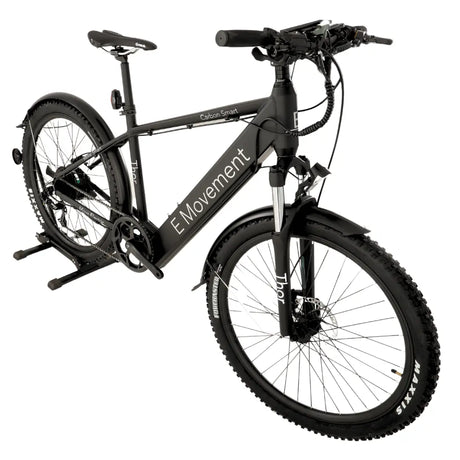Electric bikes, or e-bikes, are gaining popularity as a means of transportation in the United Kingdom. They keep people riding longer, climb hills with less hassle, and help people leave the car behind in exchange for greener transportation. With more people considering electric travel, it’s no wonder e-bikes are being promoted and considered by the government, local authorities, and local groups alike. Yet the price of purchasing an e-bike can still seem out of reach to many.
This is where grants and subsidies will help you. Whether it's a national loan scheme or local council support, there are ways to make e-bikes affordable. Many people don’t even have an idea about it.
However, this blog will explain everything you need to know about e-bike subsidies and grants in the UK. We’ll discuss who offers them, how you apply, and what they may mean in the future.
Why the UK is Promoting E-Bike Use
The UK government and local councils are encouraging more people to cycle and purchase e-bikes due to concerns about climate change, traffic pollution, and rising gasoline prices.
E-bikes help more people cycle, especially those who may find regular biking challenging due to age, hills, or health problems. And they are perfect for short rides, which keeps car use to a minimum. Substituting car rides with e-bike commutes reduces carbon emissions and eases congestion in crowded towns and cities.
Another reason for the UK to promote e-bikes is public health. Biking keeps people active and healthy. This means fewer doctor visits and a healthier lifestyle overall.
In recent years, e-bikes have also entered the conversation about cost-of-living pressures. Cycling is cheaper as the cost of fuel and public transportation increases. That’s part of why government support for cycling infrastructure, including e-bike lanes and charging stations, is expanding.
The UK has committed itself to achieving net-zero emissions by 2050. Getting additional people off these short car trips and onto e-bike trips is a step in the right direction. That’s also why we can expect more money and effort to be spent on the support of e-biking in the coming years.
National E-Bike Incentives and Support Schemes
Although there is no national e-bike grant for private buyers in England, there have, however, been significant developments to support electric cycling across the UK.
The Department for Transport funds active travel through various programmes. This includes assistance for councils who wish to trial e-bike hire or loan schemes or develop safer cycling routes.
One of the boldest steps was to establish Active Travel England (ATE). This body was established to promote walking and cycling. ATE provides funds for councils to create cycle paths, conduct e-bike training, and pilot schemes promoting the use of electric bikes.
A few pilot projects have already been launched. In Greater Manchester, for instance, a plan allows people to test ride e-bikes before purchasing. The West of England tried a similar plan. Individuals are beginning to see the importance of e-bikes in their lives through these programs.
And while no UK-wide e-bike grant matches the old electric car scheme, campaigners are calling for one. Advocates claim that providing direct aid to help purchase an e-bike could enable thousands of individuals to transition easily.
With this, of course, legal questions will arise. “Are Electric Bikes legal in the UK, etc. Yes, they are — provided they adhere to certain rules regarding speed and motor power (up to 250W) and pedal assist only. They are classified as EAPCs and can be used on bike paths and roads.
Local and Regional Grants In The UK
Local authorities have stepped in where national programmes fall short, across the UK. Here’s how various areas are making it easier for people to use e-bikes:
Scotland offers the most generous e-bike support. The Energy Saving Trust provides interest-free loans of up to £6,000 for e-bikes, including e-cargo and e-family bikes. They also support rural and community transport projects with free e-bike trials and delivery schemes. Cycling Scotland and Transport Scotland are working to extend availability, particularly in rural areas.
There is progress too in Wales. E-bike schemes have been trialled by Transport for Wales in towns including Rhyl and Swansea. These pilot programs allow users to borrow e-bikes for a few weeks to determine whether they enjoy riding them. The Welsh Government is building better bike infrastructure and considering rural mobility as well.
Councils in England have more autonomy to create their plans. For example:
-
A city council scheme in Bristol offered loans of e-bikes to people to try before buying.
-
Some London boroughs, like Hackney, have e-cargo bike grants for local businesses.
-
E-bike libraries for temporary use in Greater Manchester.
-
Workplace travel grants are offered through Nottingham City Council.
These schemes vary from place to place and may only be applicable for a limited period. Check council websites.
With the promotion of e-bikes, many people have questions like: Do you need a licence for an electric bike in the UK? There is no license required for typical e-bikes that comply with the law. But bikes with a throttle or a more powerful motor are categorized in a different category and must be registered.
Cycle to Work Schemes
One of the simplest ways to purchase an e-bike for less is by using a Cycle to Work scheme. Employees can buy an electric bike without an upfront payment with this scheme. Instead, a small amount is cut from their salary before taxes each month. This can save up to 47% off the cost of a new e-bike for riders.
Initially, these schemes were capped at £1,000. However, this has been removed for electric bikes if the provider is regulated by the Financial Conduct Authority (FCA). This way, people can have high-quality bikes without the upfront expensive cost.
Some of the UK's largest Cycle to Work providers include:
-
Green Commute Initiative
-
Cyclescheme
-
Bike2Work Scheme
They all have a few variations in the rules, so it’s worth doing a comparison. Many accept a wide variety of e-bikes, and a few even include some accessories, such as helmets and locks.
Employers must register for this scheme, which employees can then use to pick up a bike from a participating retailer. It requires no intelligence, is quick, and saves money.
Moreover, can I ride an electric bike if I get banned from driving? It's a question we often get. Yes, you can. Provided the e-bike complies with EAPC regulations, it is not considered a motor vehicle.
This has helped make e-bikes a practical and legal option for people who can’t drive legally.
Strategies for How to Access E-Bike Subsidies /Grants
Obtaining an e-bike with assistance from a grant or subsidy may sound complicated, but if you follow a few simple steps, the process is straightforward.
Look Locally First
Local councils often run short-term schemes. You can check your local council’s website or Google “e-bike grant” followed by the name of your nearest town.
Use Trusted Sources
Sites like the Energy Saving Trust update the latest information on national and local schemes. They also walk you through the process of applying.
Join Local Groups
Cycling clubs, or local Facebook groups, are places people go to share news about new schemes or free trial events.
Read the Rules
Every grant has terms. Like some that require you to live in certain areas, work for a specific kind of employer, and use the bike in certain ways.
Act Fast
Loan and grant programs are not limitless. Once the funds are spent, they’re gone. Apply early if something seems useful.
Also, remember the helmet laws for the UK. As an E-Bike rider in the UK, there is no legal requirement to wear a helmet; instead, we highly recommend you do. It makes riders safer, especially in the city or on longer rides.
Knowing how to choose an electric bike saves a lot of money. It also helps more people ride safely, confidently, and with joy.
More Grants in 2025?
The UK’s Active Travel Strategy (2023–25) includes ambitious targets for promoting cycling, including electric cycling.
Councils are urging them to set up their schemes and asking for more help from Active Travel England. Campaigners are also calling for national e-bike grants similar to the electric car scheme, which finished recently.
Duplicate trials and pilot programs are anticipated in both urban and rural areas. These will be used to test new approaches for more people to adapt to e-bikes. It includes free loans, ride-to-own plans, and direct discounts.
Conclusion
E-bikes are a greener way to get around. But the costs can still be a barrier. And that’s why the subsidies, grants, and schemes are so crucial.
Everything from council loans to national business grants is available. Some people test ride an e-bike before they buy. Others use cash back on cargo bikes or a cycle-to-work scheme.
Even if there isn’t a program running today in your region, one is likely to start soon. The UK is racing towards making electric cycling more accessible and popular.
So, for anyone who wants to just cycle to school, deliver packages, or simply cruise around on weekends, help is here to make it possible.
E-bikes aren’t just the future of transportation. They’re the now, and with the right assistance, more people can be part of the ride.






















































































